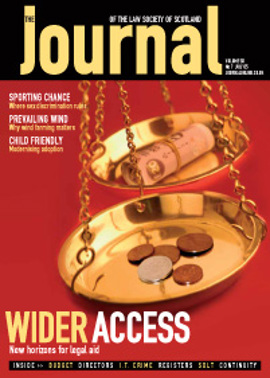Going through the motions

Locus to be heard
An interesting point arose in Sweets Service Ltd v MacCallum 2005 SCLR 376. Sheriff Principal Macphail entertained an appeal from the pursuers against an award of expenses. The defenders had been allowed to withdraw their defences and it was argued that once this was done, the defenders had no locus to be heard on the issue of expenses. The sheriff principal agreed that this proposition was sound. Once the defences were withdrawn, the action became undefended and accordingly the defenders no longer had an active part to play in the process. The sheriff principal also observed that although the parties were in dispute as to what exactly had occurred before the sheriff, the interlocutor pronounced was what he required to rely on as accurately recording what had occurred in the court below. Accordingly, it is always important to listen carefully to what the sheriff and clerk say at the conclusion of a hearing. The reason for listening to the former is obvious, the latter because the clerk is repeating what has been noted as the decision. These notes will become the interlocutor subject to the sheriff checking the accuracy of the interlocutor recorded. If the terms of the interlocutor are crucial, always obtain a copy. In particular, nothing in a sheriff’s note qualifies the terms of the interlocutor.
Forum non conveniens
In Kennedy v Aldington, 6 May 2005, this plea was taken in respect of an action for defamation raised in Scotland in circumstances in which all parties were domiciled in England. The only connection with Scotland aside from the publication and circulation of the magazine was that the pursuer’s father came from Scotland and the pursuer first was married here. The drawback against proceedings in England was time bar. The pursuer did not face this problem in Scotland. Temporary Judge T G Coutts QC repelled the plea. There was jurisdiction for the proceedings in Scotland. There was a separate basis for claim in Scotland.
Candour in pleadings
In Royal Scottish Assurance plc v Scottish Equitable plc 2005 GWD 13-221 Lord Bracadale made certain observations in circumstances in which the pursuers’ positive averments in answer to the defenders’ averments were attacked as lacking in candour. It was argued that this should colour his decision on whether the pursuers’ averments were generally specific and relevant. Lord Bracadale rejected this approach.
Decree by default
A variation on a theme can be noted in Chas Stewart Plumbing and Heating Ltd v Lowe 2005 SCLR 235. The defender had enrolled a motion to discharge a proof. This was refused. On the first day of the proof the defender was represented but not present. A further motion to discharge the proof was refused as no new information had been put forward in support of the motion. At this point the agent withdrew and the resultant motion for decree by default was continued until the following day. No one appeared for the defender the next day and decree by default was granted. An appeal against the decree was refused. Sheriff Principal Dunlop founded on there being doubts as to the viability of the defence, the age of the litigation including previous discharges of proofs at the instance of the defender, the explanation given for the absence of the defender (the failure to attend was deliberate, the defender having chosen to attend the Court of Session as a witness), the refusal of previous motions to discharge the diet, that a properly instructed agent could conduct the proof in the defender’s absence, and finally the prejudice to the pursuers from further delay. The difference between this decision and that in Barrie v Alex Butter Landscaping Ltd, Perth Sheriff Court, 14 October 2004 (see November 2004 article) is that in the latter the procedure in terms of ordinary cause rule 24 had been initiated within 14 days of the proof.
Late amendment
Although whether an amendment is allowed or not is a matter of discretion and accordingly depends inter alia on the facts in each case, it is perhaps useful to draw attention to a recent decision of Lord Brodie in Pratt v The Scottish Ministers, 4 May 2005. A motion to receive a minute of amendment was refused on the basis that procedurally the amendment came too late in the day. The factors taken account of by Lord Brodie were the passages of time from the initial incident, from the introduction of averments which ultimately prompted the amendment, and which had elapsed since new counsel had looked at the case. He further took account of the prejudice the defenders would suffer in trying to investigate the new matters, and the prospects of their recovering expenses from a legally aided pursuer. The motion to receive the amendment was refused notwithstanding the delays were not the fault of the pursuer. Further, no diet of debate or proof had been assigned. Sometimes simply there have been too many delays!
Hearsay evidence
In terms of section 2 of the Civil Evidence (Scotland) Act 1988 hearsay evidence may be admissible. In D v D, 28 June 2005 Lord Macphail was moved to accept the evidence contained in a report which bore to have been prepared by a foreign legal adviser. Objection was taken to the admissibility of this document. Lord Macphail refused to admit the document in evidence. He did so for a number of reasons. First, he was not satisfied that the document was entirely the work and authorship of the foreign legal adviser. Many of the characteristics of the document were similar to the characteristics of the defender’s evidence and a previous document the defender himself had prepared! Further, many of the matters covered in the report had no record in the defender’s averments. Accordingly, much of the content of the document would not been admissible even if the evidence had been given orally by the author of the report. Even if the document had been admitted to evidence, Lord Macphail indicated that he would have attached little weight to it. Much of the report seemed to be beyond the author’s apparent area of expertise. Further, the content was in many places partisan.
Leave to appeal
In granting leave to appeal in Friends Provident Life and Pensions Ltd v McGuiness, 3 June 2005, Lord Mackay of Drumadoon was prepared to grant the motion in light of new information put forward by the defender, albeit he was more than satisfied that his original decision was well founded on the basis of the information which had been placed before him at that time. Accordingly new information may assist in trying to persuade a judge to grant leave to appeal.
The usual caveat applies.
POSTSCRIPT
Since the last article Brogan v O’Rourke Ltd (January article) has been reported at 2005 SCLR 337, Urquhart v Sweeney (May 2004 article) at 2005 SLT 422, Wilson v Drake and Scull Scotland Ltd (March article) at 2005 SLT (Sh Ct) 39, Glasgow Housing Association v Sharkey (January article) at 2005 SLT (Sh Ct) 59, Gupta v Ross (March article) at 2005 SLT 548, and Cowan v Ramsay (May article) at 2005 SLT (Sh Ct) 65.
In this issue
- Commissioner: Public Authorities must do more
- Supporting legal aid
- No country cousins
- Making the money go further
- Adopting a new approach
- Gordon giveth and Gordon taketh away
- A blow for the future
- A Wie hint of change?
- Raising the bar
- The IT crimewave
- The directing mind
- Going through the motions
- Planning in the park
- Always look on the bright side
- Scottish Solicitors' Discipline Tribunal
- Website reviews
- Book reviews
- The race to the registers revisited
- SDLT: getting it right
- SDLT: barcoding
- Business sense






